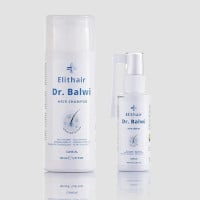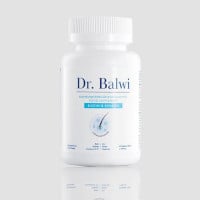
Protein Deficiency and Hair Loss
Protein plays a central role in keeping your hair strong, full, and healthy. Hair strands are built mainly from keratin, a structural protein your body constantly rebuilds through the protein you eat. In cases of severe or prolonged protein deficiency, hair follicle activity may shift toward a resting state (telogen), reducing new hair growth.
When protein is in short supply, your body shifts gears. It prioritizes organs over everything else, and hair gets left behind. That often means thinner strands, more hair in the brush, and slower regrowth.
- Protein Deficiency Hair Loss: Why It Happens
- Early Signs of Hair Loss Caused by Protein Deficiency
- Common Causes of Protein Deficiency Hair Loss
- Best Sources of Protein for Healthy Hair Growth
- Can You Regrow Hair Lost Due to Protein Deficiency?
- What To Do if Hair Thinning Persists After Recovery
- How To Prevent Protein Deficiency and Protect Your Hair
Protein Deficiency Hair Loss: Why It Happens
Without adequate protein, your body preserves its energy and nutrients for essential functions. That means hair, nonessential in the grand scheme, takes the hit first. Follicles may pause production, enter a resting phase, or shed strands prematurely.
Hair grows in a cycle: growth (anagen), transition (catagen), and rest (telogen). Amino acid shortages can trigger telogen effluvium (TE), a form of diffuse, non-scarring hair loss where many hairs prematurely enter the telogen phase.
These changes aren’t always permanent. But if the deficiency persists, it can delay recovery and impact the overall health of your hair long term.
Early Signs of Hair Loss Caused by Protein Deficiency
Unlike hereditary hair loss, protein-related shedding tends to occur diffusely across the scalp rather than in a receding pattern or crown thinning. Further, protein-related hair loss doesn’t usually happen overnight; it’s often gradual and can take time for you to notice the change. One of the first clues is increased shedding, especially when washing your hair or brushing it. Hair may also feel weaker or look duller than usual.
Common warning signs include:
- More hair in your brush or shower drain: Normal shedding is expected, but noticeable increases can suggest something’s off.
- Dry, brittle strands that break easily: Hair needs protein to stay strong. Without it, strands become more fragile.
- Slow or minimal regrowth: When hair doesn’t bounce back as quickly after damage or trims, protein might be lacking.
Other signals — like chronic fatigue, brittle nails, or frequent illness — could suggest a broader protein deficiency that’s affecting more than just your hair.
Common Causes of Protein Deficiency Hair Loss

Crash diets and similar restrictive eating habits are common contributors to protein deficiency. Skipping meals or cutting out key food groups can throw your protein intake way off balance.
Malabsorption syndromes — including celiac disease, Crohn’s disease, or chronic pancreatitis — can impair protein and micronutrient absorption, contributing to diffuse hair loss. Celiac disease, Crohn’s, and certain pancreatic issues can all make it harder for the body to process and use protein effectively.
Eating disorders like anorexia take a toll across the board, especially when calorie intake is consistently too low. Hair growth slows down or stops altogether as the body focuses on survival.
Best Sources of Protein for Healthy Hair Growth
You don’t need to completely overhaul your diet to get enough protein. What matters more is regular, balanced intake from a mix of food sources. Complete proteins — those that contain all essential amino acids — are particularly important for hair health.
Some of the best protein-rich foods to support hair health include:
- Eggs are a great all-in-one source of biotin and complete proteins that support keratin production.
- Chicken is lean and filling, providing the amino acids needed for tissue repair, including your hair.
- Lentils are plant-based powerhouses that bring protein, iron, and zinc to the table, all of which benefit your strands.
- Greek yogurt has not only protein but also gut-friendly probiotics, which help with digestion and nutrient absorption.
Rotating these foods into your meals can support stronger hair and a healthier scalp.
Keep in mind that other nutrients matter, too. Iron, omega-3 fatty acids, and vitamins A, D, and E all work with protein to keep hair growing and follicles healthy.
Most people need at least 0.8 grams of protein per kilogram of body weight each day. However, athletes, pregnant women, or those recovering from illness may need 1.2-2.0 grams per kilogram of body weight per day. Eating protein in smaller amounts throughout the day can improve how your body absorbs and uses it.
Can You Regrow Hair Lost Due to Protein Deficiency?
In many cases, addressing a protein deficiency can help restore hair growth, but there are still limits. If your body is truly lacking in protein, replenishing it can bring hair follicles back into their natural growth cycle, with results becoming visible over a few months.
That said, excessive protein will not accelerate hair growth in individuals who already meet their nutritional needs. Instead, a balanced intake of protein along with other essential nutrients supports optimal follicle health.
The most reliable improvements come with consistency: maintaining a balanced diet, managing stress, staying hydrated, and supporting scalp health. These habits work together to give your hair the best chance at bouncing back.
What To Do if Hair Thinning Persists After Recovery
If your diet has improved, but your hair still isn’t filling in, it might be time to talk to a professional. Other factors — like genetics, hormonal imbalances, or scalp conditions — could be contributing to the issue. A medical evaluation can help uncover these less obvious causes.
Even with dietary improvements, sometimes your hair still continues to thin. A dermatologist or trichologist can evaluate whether other causes — including androgenetic alopecia, chronic telogen effluvium, or scalp inflammation — are at play. In certain cases, a professional hair restoration clinic can offer deeper evaluations and more targeted treatment options.
Seeing real patient stories and reviewing cost breakdowns can give you a better idea of what to expect from procedures like follicular unit extraction (FUE) hair transplants. It also helps set realistic expectations about timelines, outcomes, and costs.
How To Prevent Protein Deficiency and Protect Your Hair
A few small changes can go a long way. Planning meals with protein in mind, watching for changes during stressful times, and checking in with your doctor regularly can all help.
Here are a few prevention tips to keep your hair and protein levels on track:
- Prioritize protein in every meal: Aim to include a good source of protein whenever you sit down to eat. This could be as easy as adding nut butter to toast, tossing beans into a salad, or including eggs with breakfast.
- Adjust your diet during physical stress: Whether you’re recovering from an illness or upping your fitness routine, protein needs often go up when your body experiences physical stressors. Increasing your intake slightly during these times can help your body heal and maintain hair growth.
- Stay on top of your health metrics: Routine lab work and annual checkups can help catch nutrient deficiencies before they show up in your hair. Ask your provider about tests for total protein, albumin, and ferritin if you’re noticing changes. Ferritin (an iron marker) is not a protein-specific indicator but is relevant for hair loss diagnosis. Including prealbumin and urea nitrogen may help assess protein status more directly.
Ultimately, taking action early can help you maintain fuller hair and keep your scalp in good shape for the long run.
If you’re ever unsure whether your protein intake is on track or if your hair changes are part of something bigger, don’t hesitate to reach out to a healthcare provider. A quick conversation or blood test can give you clarity, and sometimes, that peace of mind makes all the difference.


